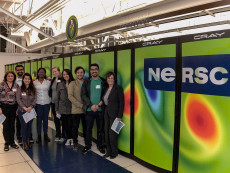Computational Research Division Hosts UC Merced Grad Students
April 25, 2018

UC Merced graduate students pose in front of the Cori supercomputer at NERSC during a recent tour. The interdisciplinary group, ranging from archaelogists to computer scientists, was hosted by CRD Director David Brown. Image: Margie Wiley
On April 19, a group of PhD students from UC Merced, all participants in the National Science Foundation’s Interdisciplinary Computational Graduate Education (ICGE) program, visited Berkeley Lab to learn about the many ways computing can be applied to research problems.
Computational Research Division (CRD) Director David Brown, who hosted the group, delivered opening and closing remarks. There were also talks from NERSC's Prabhat and CRD's Sean Peisert, Julian Borrill, Deb Agarwal, Mike MacNeil, Andy Nonaka and Silvia Crivelli. The group also took a tour of the NERSC computer room.
Brown and Deputy Lab Director Horst Simon serve on the advisory board for the ICGE program, which is now in its second year. The program is designed to enhance student success and reduce graduate student attrition rates in the computational sciences, particularly for underrepresented minorities and first-generation students, while fostering computational and data analytic skills within an interdisciplinary framework.
“Fifty percent of PhD students nationwide drop out, and that number is even higher among minority students,” said Prof. Marjorie S. Zatz, principal investigator for the UC Merced ICGE program and vice provost and graduate dean at the university. “By providing these opportunities and multiple mentorships, we provide a very safe environment for these students to learn and explore and manage interactions. It is a mix of learning coding, working on projects, successfully navigating through graduate school and moving into the business world.”
About Computing Sciences at Berkeley Lab
High performance computing plays a critical role in scientific discovery. Researchers increasingly rely on advances in computer science, mathematics, computational science, data science, and large-scale computing and networking to increase our understanding of ourselves, our planet, and our universe. Berkeley Lab’s Computing Sciences Area researches, develops, and deploys new foundations, tools, and technologies to meet these needs and to advance research across a broad range of scientific disciplines.







 Instagram
Instagram YouTube
YouTube